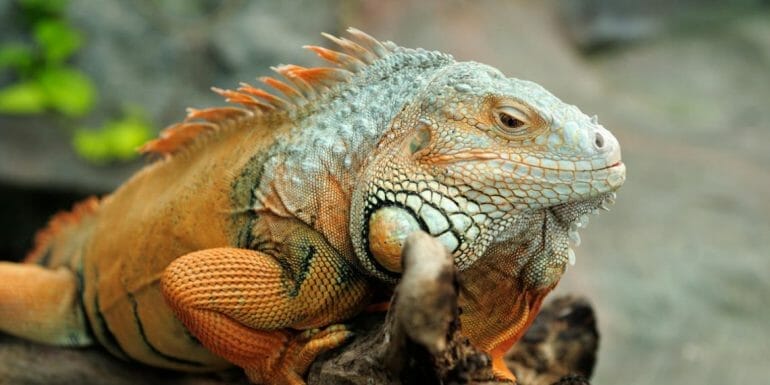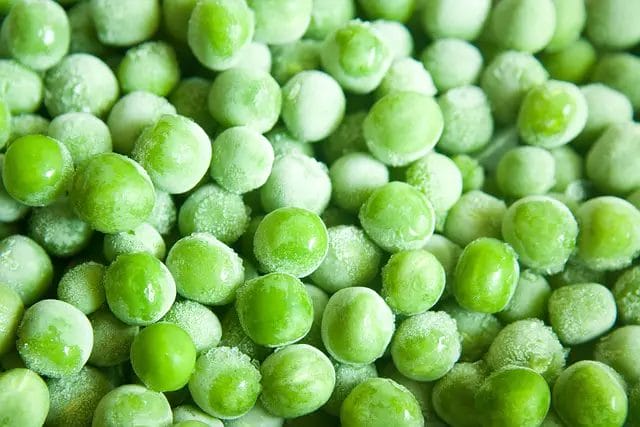Wondering if iguanas can eat zucchini? The answer is yes! Zucchini is a safe and nutritious food for iguanas to consume.
Rich in vitamins and minerals, zucchini can provide a healthy boost to their diet. It is low in calories and high in water content, which helps to keep iguanas hydrated. Additionally, the soft texture of zucchini makes it easy for them to consume and digest.
However, it’s important to remember that zucchini should be given to iguanas in moderation. It should be properly washed and cut into small, manageable pieces to prevent choking hazards. As with any new addition to their diet, it’s recommended to introduce zucchini gradually and observe their response.
So, next time you’re planning your iguana’s meal, consider adding some zucchini to provide them with a nutritious and delicious treat!

Tips for Feeding Zucchini to Your Iguanas
Feeding your iguana a balanced and nutritious diet is essential for its overall health and well-being. While iguanas primarily eat leafy greens, it is also beneficial to include other vegetables in their diet to provide a variety of nutrients. One such vegetable that you can offer to your iguana is zucchini.
Zucchini is a versatile and nutrient-rich vegetable that is safe for iguanas to consume. Here are some tips to ensure that you are feeding zucchini to your iguanas in a way that promotes their health:
1. Choose Fresh and Organic Zucchini
When selecting zucchini for your iguana, it is important to choose fresh and organic produce. Avoid zucchinis that are wilted or have visible signs of decay. Organic zucchinis are free from pesticides and other harmful chemicals that can be harmful to your pet.
2. Wash Thoroughly
Before feeding zucchini to your iguana, make sure to wash it thoroughly under running water to remove any dirt or residue. This step is crucial, as it helps eliminate any potential contaminants that could be harmful to your pet.
3. Cut Zucchini into Small Pieces
Iguanas have small mouths and may struggle to eat large pieces of zucchini. To make it easier for them to consume, cut the zucchini into small, bite-sized pieces. This also helps prevent the risk of choking and ensures that your iguana can easily digest the vegetable.
4. Offer Raw or Cooked Zucchini
Zucchini can be fed to your iguana both raw or cooked. However, it is important to note that iguanas generally prefer raw vegetables. If you choose to cook the zucchini, avoid using any seasonings or additives, as they can be harmful to your pet.
5. Introduce Zucchini Gradually
If your iguana is new to eating zucchini, it is recommended to introduce it gradually. Start by offering a small amount of zucchini alongside their regular diet. Observe their response and ensure that they tolerate the vegetable well before increasing the quantity.
6. Rotate with Other Vegetables
Variety is key when it comes to feeding your iguana. While zucchini is a nutritious vegetable, it is essential to offer a diverse range of vegetables to ensure that your pet receives all the necessary nutrients. Rotate zucchini with other vegetables like kale, collard greens, and bell peppers.
7. Monitor Your Iguana’s Response
After introducing zucchini into your iguana’s diet, closely monitor their response. Watch for any signs of digestive issues, such as diarrhea or constipation. If you notice any adverse reactions, discontinue feeding zucchini and consult a veterinarian.
In summary, feeding zucchini to your iguana can be a healthy addition to their diet. By following these tips, you can ensure that your pet receives the nutritional benefits of zucchini while keeping them safe and happy.

Alternatives to Zucchini for Iguana’s Diet
Iguanas are herbivorous reptiles that require a balanced diet to maintain their health and well-being. While zucchini is often recommended as a staple food for iguanas due to its high nutritional content, it is important to provide them with a variety of other vegetables to ensure a diverse and well-rounded diet. Here are some alternative vegetables that you can include in your iguana’s diet:
1. Collard Greens
Collard greens are a great source of vitamins A and K, calcium, and fiber. They are low in oxalates, making them safe for iguanas to consume regularly. You can chop the collard greens into small pieces and mix them with other vegetables to create a nutritious salad for your iguana.
2. Mustard Greens
Similar to collard greens, mustard greens are rich in vitamins A and K, calcium, and fiber. They have a slightly peppery taste that some iguanas may enjoy. As with collard greens, it is best to chop them into small pieces and incorporate them into your iguana’s diet.
3. Dandelion Greens
Dandelion greens are readily available and highly nutritious for iguanas. They are an excellent source of vitamins A, C, and K, as well as calcium and iron. You can offer dandelion greens as part of your iguana’s salad or use them as occasional treats.
4. Kale
Kale is another nutritious leafy green that can be included in your iguana’s diet. It is a good source of vitamins A, C, and K, as well as calcium and fiber. Remember to chop the kale into small pieces to make it easier for your iguana to consume.
5. Bell Peppers
Bell peppers are not only vibrant and colorful but also a great source of vitamins A and C for your iguana. They can be sliced into thin strips or small cubes and added to your iguana’s salad or offered as a standalone treat.
6. Squash
Squash, such as butternut or acorn squash, is a good alternative to zucchini for providing variety in your iguana’s diet. It contains vitamins A and C, as well as potassium and fiber. You can steam or cook the squash before serving it to your iguana.
7. Cactus Pads
Cactus pads, also known as nopales, are a unique addition to your iguana’s diet. They are low in oxalates and high in fiber and water content. Before offering cactus pads to your iguana, make sure to remove any thorns and chop them into small, manageable pieces.
It is important to note that while these vegetables are generally safe for iguanas, it is essential to introduce new foods gradually and monitor your iguana’s response. Some iguanas may have specific dietary requirements or preferences, so it is always recommended to consult with a reptile veterinarian for personalized dietary guidance for your iguana.

Common Mistakes to Avoid When Feeding Zucchini to Iguanas
Feeding proper nutrition to your pet iguana is crucial to its overall health and well-being. While iguanas are primarily herbivores, they require a varied and balanced diet to thrive. One popular vegetable that many iguana owners incorporate into their pet’s diet is zucchini. Zucchini is a nutritious and easily digestible vegetable that can provide essential vitamins and minerals to your iguana. However, there are some common mistakes that owners make when feeding zucchini to iguanas that can negatively impact their health. In this section, we will discuss these mistakes and how you can avoid them.
1. Feeding Unripe or Overripe Zucchini
One of the most common mistakes that iguana owners make is feeding unripe or overripe zucchini to their pets. Unripe zucchini can be challenging for iguanas to digest and may cause gastrointestinal issues such as bloating or diarrhea. On the other hand, overripe zucchini can be mushy and may not provide the necessary nutrients for your iguana. It is essential to choose ripe zucchini that is firm but not too soft. Look for zucchini with a vibrant green color and no signs of mushiness or discoloration.
2. Not Washing Zucchini Properly
Another mistake that iguana owners often make is not washing zucchini thoroughly before feeding it to their pets. Zucchini, like other vegetables, can harbor pesticides, dirt, and bacteria on its surface. It is crucial to wash the zucchini under running water and scrub it gently to remove any dirt or residue. This ensures that your iguana is not exposed to any harmful substances that could potentially harm its health.
3. Offering Zucchini as the Sole Food Source
While zucchini can be a nutritious addition to an iguana’s diet, it should not be the sole food source. Iguanas require a varied diet that includes a mix of vegetables, fruits, and leafy greens to meet their nutritional needs. Feeding only zucchini can lead to nutritional deficiencies and health problems in the long run. Make sure to provide a balanced diet by offering a variety of vegetables and occasionally include other safe foods such as fruits or herbs.
4. Ignoring Portion Control
Portion control is essential when feeding any food to your iguana, including zucchini. Overfeeding can lead to obesity, which is a common problem among captive iguanas. It is recommended to offer zucchini as part of a balanced meal and monitor your iguana’s intake. Adjust the portion size based on your pet’s size, age, and activity level. Consulting a reptile veterinarian or an experienced iguana owner can help you determine the appropriate portion size for your specific iguana.
Summary
Feeding zucchini to your iguana can be a great way to provide essential nutrients and variety to its diet. However, it is crucial to avoid common mistakes such as feeding unripe or overripe zucchini, not washing the vegetable properly, relying solely on zucchini as the food source, and ignoring portion control. By following these guidelines, you can ensure that your iguana receives a well-balanced and nutritious diet for optimal health and happiness.
Incorporating Zucchini in a Balanced Diet for Iguanas
Iguanas are herbivorous reptiles that require a balanced diet to thrive. While there are numerous vegetables that can be included in their diet, zucchini is a particularly nutritious and beneficial option. In this section, we will explore the reasons why incorporating zucchini into an iguana’s diet is a great idea.
1. Nutritional Value of Zucchini
Zucchini is packed with essential nutrients that are beneficial to an iguana’s health. It is a low-calorie vegetable, making it an ideal choice for maintaining a healthy weight in these reptiles. Zucchini is rich in vitamins A, C, and K, which are important for the overall well-being of an iguana. Additionally, it contains minerals such as potassium, calcium, and magnesium, which promote strong bones and muscle function.
2. Hydration and Digestion
Zucchini has a high water content, which is beneficial for iguanas as it helps to keep them hydrated. Adequate hydration is essential for proper digestion and overall metabolic function in these reptiles. Including zucchini in their diet can help prevent dehydration and promote healthy digestion.
3. Fiber Content
Fiber is an important component of a balanced iguana diet, as it aids in proper digestion and prevents constipation. Zucchini is rich in dietary fiber, which helps regulate bowel movements and maintain a healthy digestive system. Incorporating zucchini into an iguana’s diet can contribute to a well-functioning digestive tract.
4. Variety in Diet
Offering a diverse range of vegetables is crucial when it comes to providing a balanced diet for iguanas. Introducing zucchini as part of their regular vegetable rotation ensures that they receive a variety of nutrients. This variety helps prevent nutrient deficiencies and promotes overall health and well-being in iguanas.
5. Feeding Zucchini to Iguanas
When feeding zucchini to iguanas, it is important to prepare it appropriately. Wash the zucchini thoroughly to remove any pesticides or dirt. Cut the zucchini into small, bite-sized pieces that are easy for the iguana to consume. It is recommended to offer zucchini in moderation, along with other vegetables, to maintain a balanced diet.
In summary, zucchini is a nutritional powerhouse that can greatly benefit an iguana’s diet. Its high water content, fiber content, and essential nutrients make it an excellent addition to their vegetable rotation. By incorporating zucchini into an iguana’s balanced diet, owners can ensure that their pet reptiles receive the necessary nutrients for optimal health and well-being.
FAQs
Can iguanas eat zucchini?
Yes, iguanas can eat zucchini. It is a safe and healthy vegetable for them to consume. However, remember to cut it into small pieces and remove any seeds or skin before feeding it to your iguana.
Conclusion
In conclusion, iguanas can indeed eat zucchini. Zucchini is a safe and nutritious vegetable for iguanas to include in their diet. It provides essential vitamins and minerals, such as vitamin C and potassium, which are beneficial for their overall health. However, it is important to note that zucchini should be given to iguanas in moderation and as part of a balanced diet. It should never be the primary food source for iguanas. Additionally, it is crucial to offer fresh and properly washed zucchini to ensure the iguanas’ well-being. Overall, zucchini can be a great addition to an iguana’s diet, but always consult with a reptile veterinarian for specific dietary recommendations.

